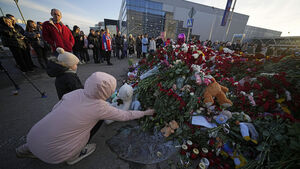It is time to shout stop on social media's worst excesses

People lay flowers at a makeshift memorial in front of the Crocus City Hall on the western outskirts of Moscow, Russia, after the recent terrorist attack. Picture: AP Photo/Alexander Zemlianichenko
Unless you are living under a stone, you should have noticed a sickening new trend that is emerging from the darkest recesses of the internet. Media savvy extremists and terrorists, not content with perpetrating atrocities, are now broadcasting their rampages live for a disturbed but fascinated global audience. Death has become a spectacular, interactive event - a real-time window into the gunmen's twisted psyches as they livestream carnage in visceral detail.
We first glimpsed this grotesque phenomenon in New Zealand with the Christchurch mosque shooter in 2019. That deranged racist killer strapped on a GoPro camera, announcing his murderous intentions on fringe online havens before livestreaming his assault on Facebook as it unfolded. Disturbingly, he encouraged an online community of fellow misfits to spread his sick video across the web.
The clip went viral despite media bosses' belated efforts to remove it, and soon it had been replicated and remixed into memes fetishising the killer. Just a month later, he inspired a copycat with the Poway synagogue shooting, where another disturbed young man tried and failed to capture his act on camera. An unnerving new ritual was seeping from the web's underbelly.
But last week in Krasnogorsk, outside Moscow, this mutated into something altogether more pernicious. The terror attack on the Crocus City Hall concert venue wasn't just a rampage - it was conceived as grand-scale performative violence designed to shock, thrill and terrorise a global virtual audience. A video shot by gunmen who carried out the deadly attack on a Moscow concert was posted on social media accounts typically used by the jihadist group Islamic State. The video, which lasts a minute and a half, shows several individuals with blurred faces and garbled voices, armed with assault rifles, rampaging through the crowded auditorium, killing at least 133 people.
Multiple cameras awaited the gunmen, courtesy of myriad iPhones and Android devices, held aloft by still disbelieving attendees as the carnage unfolded. Within minutes, chat rooms and encrypted forums across the dark web crackled with countdown clocks and back-channel broadcast links.

We are witnessing a potential revolution in atrocity pornography. No longer solo bedroom slayers, these new executioners have become degenerate death vloggers, piping stomach-churning live sadism to an audience in real time.
As shocking as it sounds, maybe we shouldn't be too surprised. Our increasingly digitised culture has grown accustomed to relentless exhibitionism and oversharing online. We've normalised the foul spectacle of the self-broadcast to immoderate excess. It was only a matter of time before that voyeurism fetish found its ultimate extreme.
While that broader context helps explain these massacrers' mutant appeal, it can never excuse or normalise their depravity. Live streamed killing remains a line no civilised society can accept being crossed, however unexpected. The fact that this spectacle occurred at all represents a collective failure of our social platforms.
Media platforms are falling utterly short when it comes to live horror shows. They need more competent moderation, faster breach responses, and ethical responsibility toward human life over livestream availability. In the aftermath, their vows to do better will ring painfully hollow. Bitter recriminations will abound over their facilitation role, whether direct or passive.
It is understandable, then, that governments have felt compelled to act, with harsh penalties enforcing decisive shutdowns for any social platform airing live-streamed violence unchecked. For today's web giants, the new regulatory regimes may seem excessive, even existential. But at some point, emerging media has to face its responsibilities. If social media platforms won't self-police against glorified murder, democratic societies must step in.
It's a tough call. In Ireland, we are wrestling with the complexities of legislation that might constitute the death of free speech online. Live streaming sends such considerations into the moral stratosphere. Perhaps at its molten core, the livestream issue simply exposes the ugly truth about social media's psyche - that it has enabled and profited from the spread of hatred and depravity to the furthest fringes.
Whatever path is taken, it has to be a more intelligent, ethical, and humanised approach than the carnage-baiting apathy we've seen. Society cannot allow such flagrant human dignity and decency breaches to go unchallenged. Whether through stern regulation or a road to Damascus self-awakening, our social platforms must sever all ties of collaboration with the death streams now threatening to course through the digital underground.
For now, the digital feed may have frozen on Krasnogorsk. But this grim trend has only just hit its opening atrocities. Another massacre broadcast surely awaits in the wings if no action is taken - coming soon to your phone screen, ready to trap you in its sickening high-definition close-ups of human ruination.
We cannot tune out and let the internet's dark heart keep pumping out these aberrations into an oblivion of disinterested moderation. Our collective vigilance has already slipped, and inevitably, they'll flood through again in lurid living realities none of us can unsee. Blood and screams made hyper-real, translated directly from rupturing normality into the palm of every phone.
As media consumers, we can refuse to become passive spectators to this live-streamed obscenity. To consume these ungoverned broadcasts of human atrocity as mere viral content is to accept their normalisation, their insidious creep into the mainstream.
A line has been crossed that cannot be allowed to dissolve into a grotesque new status quo. The spectacle of death lived to trend another day in Krasnogorsk. But this cannot become our unforgivable future - multimedia slaughter feted on each sordid and well-planned stream. We must say enough is enough and summon the moral fortitude to repel these broadcasts of depravity back into the swamps of malign hatred and inhuman cruelty from whence they crawled.
That starts with holding accountable all who brokered this wretched transaction - the hosts who aired the murders and the gunmen gratified by the bloody spectacle. And it continues in vigilance over ourselves, too - in refusing to let these snuff experiences colonise our consciousness or addict us to their lurid impact as mere news.
Death must never become a live-streaming indulgence. We are no passive viewership to be softened up for these exhibitions of human extinguishing. However extreme or desensitised the web's inhabitants believe they have become, such depravity has no place on our civilised networks or collective spaces.
If left unchecked, these spectacles of death demean us all. We are obligated as a society to be their active resistance, shunning the corrosion of their sinister opportunism and rejecting utterly their false promises of dark catharsis through the debasement of human suffering as an event. They are snakes, and we cannot allow them to slither further into the light.
There is no place in civilised discourse for another Krasnogorsk. There is no harbour to be given among unsuspecting consumers to these broadcasts of the summarily executed. Starve them of the exposure that sustains them. Excise them utterly from temptation's reach. Only with such resolute moral conviction can we overcome this path to human degradation the terrorists crave in the 15 minutes of stolen fame. Only through unwavering vigilance against their toxic proliferation can the recognition of the sanctity of human life that has characterised western civilisation for millennia ultimately prevail.




